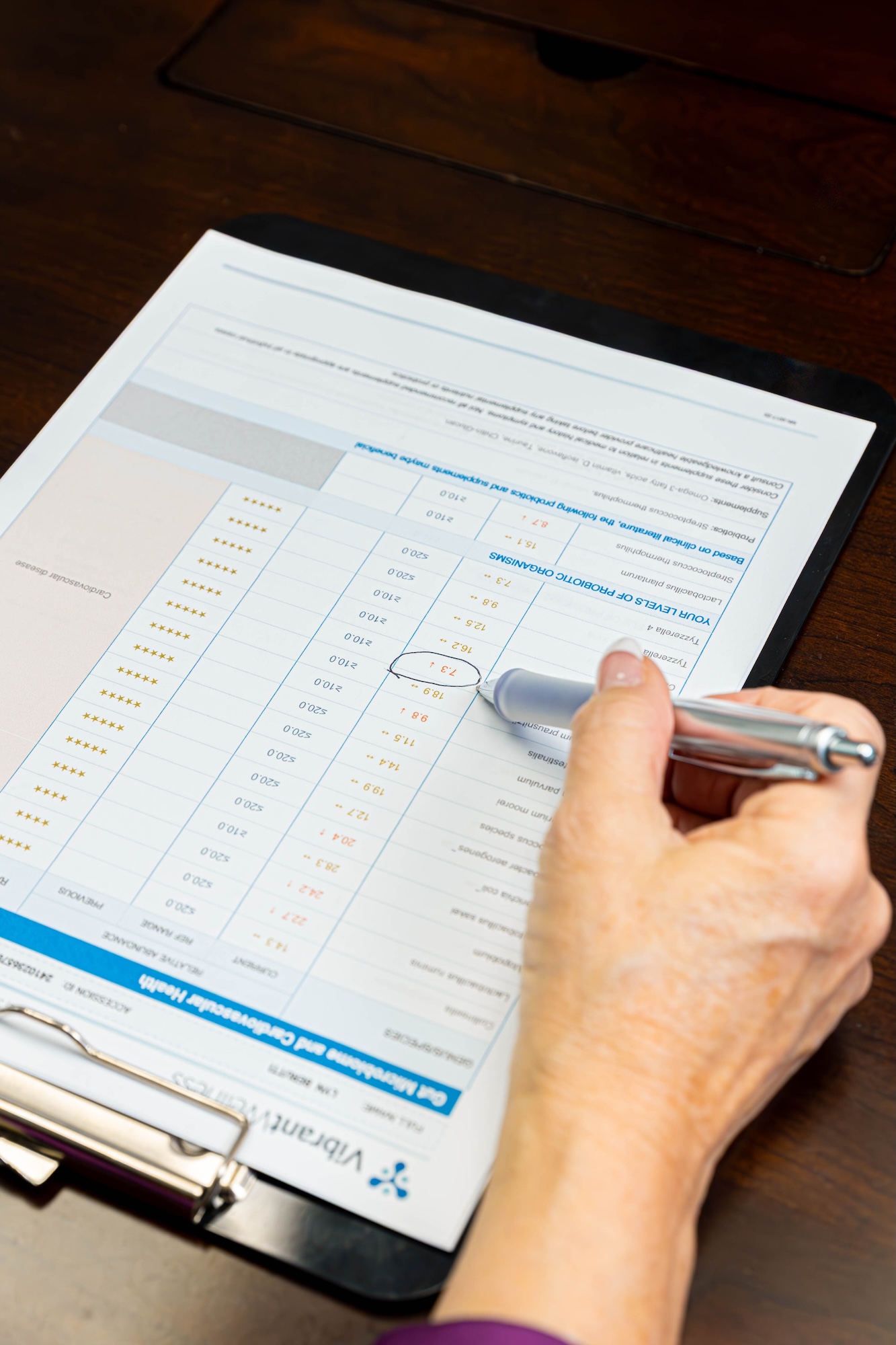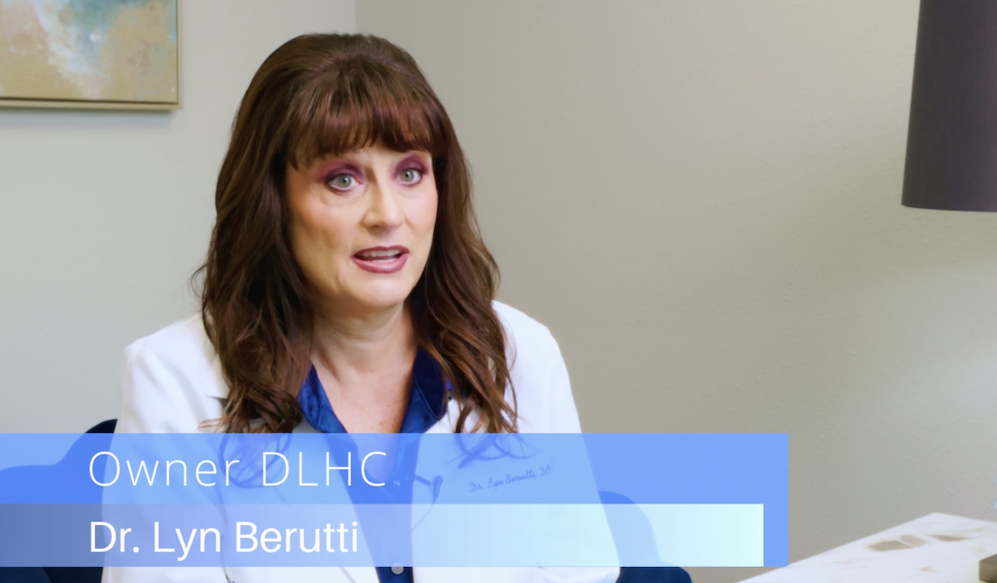



Overview
Understanding Gut Health
At Dynamic Life Health Center, we know that staying healthy starts from the inside. People often overlook gut health, which is why we address your gut health directly with detailed testing and personalized methods of treatment.
The gastrointestinal tract, also known as the gut, digests food. Your gut is one of the major lines of defense your body’s systems have against disease. Several aspects of your health, such as weight management and mental health concerns like anxiety and depression, can be connected to an imbalance of your gut microbiome.
This microbiome is essential for breaking down the nutrients that energize your body.
Importance of a Healthy Gut
Your gut bacteria produce vitamins, minerals, and even brain neurotransmitters, which can affect the overall health of your body in many ways.
In addition to digesting food, your gut is responsible for:
- Absorbing nutrients
- Regulating 70% of your immune system
- Producing essential vitamins
- Protecting against pathogen overgrowth
- Regulating intestinal mucosal barriers
In order to improve your gut health, you must achieve a balance between the different bacteria living in your microbiome. Our team at DLHC is well-equipped to help you nourish and protect your gut microbiome.
Ways to Improve Gut Health
You are the biggest influencer of your gut health through diet, the medications you take, and your lifestyle. Based on our gut health testing, we recommend an optimal diet and a lifestyle that supports gut health. We understand that some people may have chronic conditions that make this more difficult. This is why our team personalizes every treatment plan. From nutritional recommendations to supplements and medications, we will support you on your journey toward optimized gut health. Research has shown that foods high in sugar, unhealthy fats, antibiotics, stress, and gluten all contribute to gut imbalances.
Symptoms & Conditions
Diagnosing Gut Health Concerns
Based on your symptoms and health goals, our providers will determine which testing is right for you. Your diagnostic testing may include both serum and stool testing.
Common Gut Health Concerns
Leaky Gut Syndrome
This condition happens when your intestinal lining weakens. When your gut becomes more permeable, it allows a “leak” of water and nutrients. As time goes on, this leakage can get worse, creating problems in your whole body through your bloodstream. If you have leaky gut syndrome, you may experience:
- Abdominal pain
- Bloating
- Indigestion
- Food sensitivities
- Diarrhea
- Gas
Chronic Constipation
Chronic constipation is a condition where a person experiences infrequent, difficult, or incomplete bowel movements. It can be caused by low fiber intake, dehydration, thyroid disorders, medication, or disrupted gut health.
Heartburn
Heartburn is a burning sensation in your chest that can be caused by spicy, fried foods, low stomach acid, poor digestion, overgrowth of bacteria, weight gain, or medications.
DLHC’s expert providers will look at how your body’s various systems work in unison to improve your gut health in Southlake.
Testing & Diagnoses
Our Gut Health Testing Partners
At DLHC, we offer comprehensive testing to help restore your gut health. We offer Vibrant Food Sensitivity and Additive testing, Genova SIBO testing, Genova GI Effects testing and Vibrant Gut Zoomer testing. We offer food allergy testing through LabCorp and Quest.
Vibrant Food Sensitivity and Additive Testing
Vibrant Food Sensitivity and Additive testing will determine if you have sensitivities to hundreds of common food or additives which may be linked to the activation of your immune system. Additionally, some symptoms that you may experience if you have food sensitivities are digestive disorders, migraines, chronic fatigue, joint and muscle aches, obesity, and skin rashes.
Genova Small Intestine Bacteria Overgrowth Test (SIBO)
The Genova SIBO test is a simple at-home breath test that measures methane or hydrogen bacterial levels in your small intestine. Patients who have SIBO often experience abdominal pain, diarrhea, constipation, and gas. SIBO is associated with IBS, IBD, Celiac Disease, Type 2 diabetes, Fibromyalgia, Parkinson’s Disease, and Obesity.
Genova GI Effects Test
The Genova GI Effects Test is a stool test that looks at overall gut health, the function of your digestive system, inflammation, and imbalances within the microbiome, including testing for bacteria, yeast, and parasites.
Vibrant Gut Zoomer
The Vibrant Gut Zoomer test assesses bacteria, yeast, viruses, and parasites in the gut microbiome, alongside relevant digestive and inflammatory markers. The panel measures hundreds of species of microbes, providing the most comprehensive digestive health test on the market. If you’re experiencing any of these symptoms of leaky gut, microbiome imbalance, GI disorders, or abnormal digestion, you may benefit from this panel.
Keeping Your Gut Healthy
How to Restore Gut Health
If you have digestive issues, autoimmune problems, hormonal imbalances, or chronic disease, by getting your digestive tract in balance, it’s possible to drastically improve your health, and in many cases, even reverse some of the issues you may be experiencing.
Dr. Berutti and Melanie Martin, PA, are experts on gut health, hormone balancing, thyroid balancing, and anti-aging. They can provide you with the professional expertise needed in order to feel better and lead a longer and healthier life.
Our approach to treatment will focus on improving your diet and lifestyle to support that relationship through your microbiome. In order for your body to function at peak performance, focusing on your gut health is a must. We have designed our treatments to both combat gut conditions and improve the overall gut microbiome.
DHLC’s Recommendations
- Change your diet. Studies show that improving the type of food you eat can make a difference in as soon as 24 hours. Bad bacteria feed off processed foods that contain high amounts of sugar and bad fats. Conversely, whole, unprocessed foods, especially foods high in fiber, have been shown to improve the balance of good bacteria.
- Make sure that you are taking a good probiotic supplement. This adds beneficial bacteria to the gut microbiome.
- Avoid antibiotics unless absolutely necessary, since they wipe out a significant number of good bacteria in your gut (in addition to killing the bad bacteria), leaving you more vulnerable to yeast and harmful bacteria.
- Avoid taking NSAIDs unless absolutely necessary. Studies show that these types of drugs (Advil, Motrin, Aleve) can alter your gut bacteria in only 24 hours.
- Limit the use of proton pump inhibitor drugs for heartburn and other digestive issues. These types of drugs inhibit the production of stomach acid, which is vital to the proper breakdown of food before it enters the intestines.
- Eat probiotic-rich foods such as fermented veggies, kefir, kimchi, and sauerkraut as these contain live, healthy bacteria.
- Exercise. One benefit of exercise is that it reduces the inflammatory responses that occur within the body and can reduce the effects of mental and physical stress.
- Manage stress. Stress can be mental, emotional, and physical. Lifestyle choices such as the foods you eat or how much sleep you get can burden the body with excess stress, which can contribute to disease.
- Get enough sleep. Many research studies have shown that not getting enough sleep can contribute exponentially to stress and the inability to deal with it. Lack of sleep also has a direct effect on gut health.
There is a strong connection between your gut and your health. between your We are seeing a major rise in the number of diseases, and more research is proving that an unhealthy gut leads to disease, so it’s important to listen to your gut.






